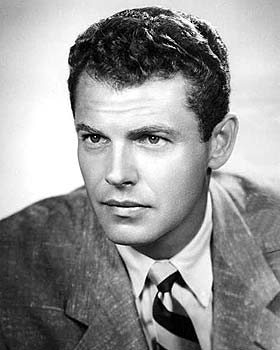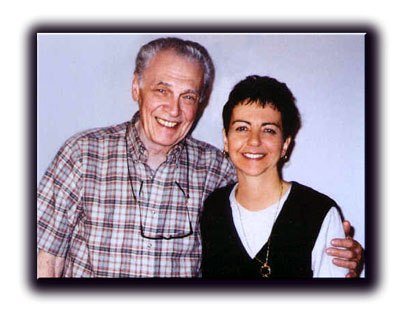
Ed Kemmer's
Home page
Memories from:
Introduction
Warren Chaney
Chuck Lassen
Beth Flood
Jack McKirgan
Jean-Noel Bassior
Elliott Swanson
Marty Baumann
Christine Hood
Solar Guard Posts
|
 Cadet Memories of Ed Kemmer Commander In Chief Of the Space Patrol Jean-Noel Bassior I want to tell you about Ed’s memorial service.  It
was held on November 12th at Riverside Chapel on 76th and Amsterdam Avenue in
Manhattan. It had been clear all week, but it rained that day. A large crowd of
family and friends gathered – I’m not sure how many, but I’d estimate
maybe 150, and there was standing room only, which, as someone remarked, would
delight any actor. Since Ed was cremated, he wasn’t physically present, but
there was a large photo of him at the front of the room. It had been taken by
his son Jonathan last year, and Ed had sent me several prints from this shoot. It
was held on November 12th at Riverside Chapel on 76th and Amsterdam Avenue in
Manhattan. It had been clear all week, but it rained that day. A large crowd of
family and friends gathered – I’m not sure how many, but I’d estimate
maybe 150, and there was standing room only, which, as someone remarked, would
delight any actor. Since Ed was cremated, he wasn’t physically present, but
there was a large photo of him at the front of the room. It had been taken by
his son Jonathan last year, and Ed had sent me several prints from this shoot.
The entire service was memories of Ed shared by friends. A cousin recounted the events of his life. She’d pulled facts from the Web, and I recognized a lot from Solar Guard, Roaring Rockets and the book write-up on amazon, because few people there knew much about his war experience or Space Patrol. I don’t think anyone present had known him then. Some spoke about his passion for politics, joking that they were afraid to argue with him because he was so adamant about his beliefs (That’s our Commander!). Several recalled how he’d given them money or kind words when they were going through a crisis. Fran always said that Ed couldn’t say no to anyone in need. I spoke about the last e-mail I got from him, a few days before he died. In it, he did something he’d never done before. It made me smile at the time, but after his death, I understood it better. Ed insisted he wanted to wait until the book was published to read it, but he did see the preface, and I tricked him into reading Chapter 1 by sending it to Fran. Of course, I respected his wish to wait for the finished version (which he didn’t), but I enjoyed teasing him by e-mailing a draft of the cover and – when they arrived, at last – a sample page proof. I’d warn him with a menacing subject line, like CAUTION: PAGE PROOF ATTACHED. He liked that, and (against his policy) would always look. What I’m getting to is what happened with the back cover. For some reason, I wasn’t sure if I should send it to him. I hesitated. By the time I got it from McFarland, we were only a month away from publication, and he was going to see the whole book soon. But something urged me to ask him if he wanted to see it. He said yes right away, to my surprise.  Now,
you should know this about the back cover: It makes a good case for Space Patrol’s
impact. It has a blurb from Leonard Nimoy saying that Space Patrol was “groundbreaking.”
(Ed really liked that Nimoy gave me that quote.) And Ed is featured on the back
cover, too. It calls him a “real-life World War II hero” and notes that,
50 years later, he was still receiving letters from ex-kids who claim that Space
Patrol changed their lives. Ed had some problems accepting both these things.
It was only recently that he’d come to terms with the enormous impact he’d
had on so many as “Corry.” I write about his struggle with that in the
book, and at the memorial service I recalled how, when I first met him in 1984,
he was pushing all that away, keeping it at arm’s length. I told how many
of us had written him through the years, reminding him of his impact on our childhood
and our lives. Of course, it wasn’t always easy to put that into words, but
we tried. I told how (in the book) I confront him with some “evidence”
of his impact – quotes from people whose lives he touched profoundly. But
even though he had slowly begun to accept this, he balked at the “real-life
hero” tag; he didn’t like that one at all. And now, here was the back
cover, playing up all this stuff he’d resisted for years. Which brings me
to his last e-mail. Now,
you should know this about the back cover: It makes a good case for Space Patrol’s
impact. It has a blurb from Leonard Nimoy saying that Space Patrol was “groundbreaking.”
(Ed really liked that Nimoy gave me that quote.) And Ed is featured on the back
cover, too. It calls him a “real-life World War II hero” and notes that,
50 years later, he was still receiving letters from ex-kids who claim that Space
Patrol changed their lives. Ed had some problems accepting both these things.
It was only recently that he’d come to terms with the enormous impact he’d
had on so many as “Corry.” I write about his struggle with that in the
book, and at the memorial service I recalled how, when I first met him in 1984,
he was pushing all that away, keeping it at arm’s length. I told how many
of us had written him through the years, reminding him of his impact on our childhood
and our lives. Of course, it wasn’t always easy to put that into words, but
we tried. I told how (in the book) I confront him with some “evidence”
of his impact – quotes from people whose lives he touched profoundly. But
even though he had slowly begun to accept this, he balked at the “real-life
hero” tag; he didn’t like that one at all. And now, here was the back
cover, playing up all this stuff he’d resisted for years. Which brings me
to his last e-mail.In it he said the back cover looked “great” and he was “really looking forward” to reading the book. But what made me do a double-take was the way he signed this final note. Above his name, he wrote in quotes: “A real-life hero.” Now, that was totally out of character, and I knew he was teasing, as if to say, “Boy, they just had to stick that in there, didn’t they?” But, looking back, I think that maybe there was a deeper meaning. I think he was saying that he finally “got it” – that, for a second, he’d glimpsed in himself what we saw in him. And though he was clearly joking, I sensed that, on some level, he’d finally owned it – that hero thing that stalked him all his life, no matter how much he pushed it away. Maybe he let just a bit of it in; at least, I like to think that’s true. |